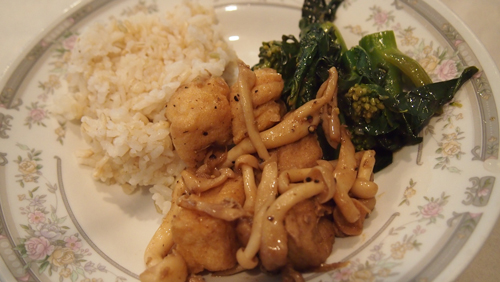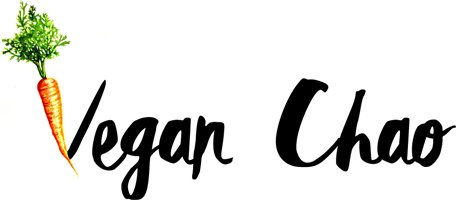In my career as a somewhat healthy herbivore, I’ve established a rotating roledex of products that I’ve used on a consistent basis in a pinch. One of these products, the versatile tofu pocket, has served me quite well whenever I would be in the throes of hunger and saved me from a deep abyss of stomach growling (pardon my archaic lingo, I seem to be in rare form today).
First of all, where does one find this convenient product? It’s not sold in a regular American supermarket, alas. But it can be found in any ubiquitous Chinese/Asian grocery, so whenever you get the chance, do pick a few of them up. They can be frozen in the freezer for a long time and will still taste just as fresh, so no worries about that.
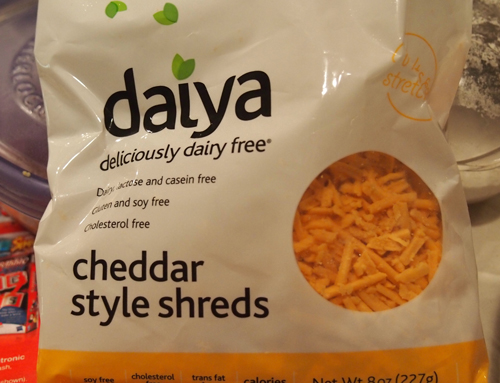
There are quite a few ways you can use the pockets. Like a healthier, salty version of a cream puff, the pockets can be filled with whatever you please. I’ve tried mashed potato, seasoned soft tofu, a medley of mushrooms and in this case, Daiya with some leftover salad greens and heart of artichoke. Really, the possibilities are endless.
This recipe does take a bit longer, about 30-40 mins total, so if you don’t have as much time on your hands, skip to my second recipe further down.
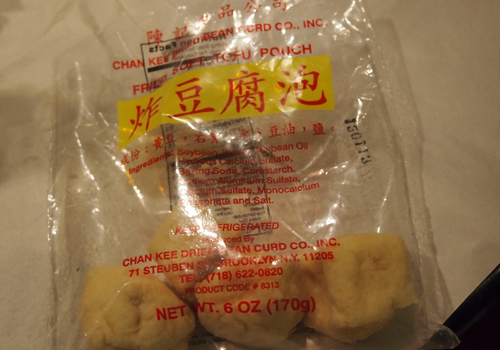
There are a multitude of sizes for this particular product. Today, I used the type pictured above, since they are the biggest one I’ve found so far.
First, gather the ingredients you would like to use for stuffing. I recommend items that aren’t too solid, like whole celery stalks or uncut carrots… these don’t taste that great anyhow. You should ideally get them into a shredded, handle-able state.
Like I mentioned before, I chose to use a combination of cheddar Daiya and chopped salad greens, which included broccoli, carrot, tomato and artichoke heart. These were a bit harder to handle, but if you choose a more malleable filling, it should be no problem.
Recipe:
1) Cut open your pocket. This is easy to do with a slim, sharp knife. I prefer cutting near the edge of a pocket so the stuffing will stay inside most effectively.
2) Using your finger, push away the lining of the pocket so a “pouch” is created in which to insert the filling. The pocket naturally has some soy fibres inside by default. Pushing the fibres down will create room in which to put your filling.
3) Now for the harder part: getting the filling in. You may choose to use a spoon to handle the ingredients, depending on the filling. For more solid fillings, like with my Daiya and greens, you should gather the ingredients firmly in your finger, then quickly push it into the pocket. Take care not to rip the pocket open… though it’s ok if the opening stretches more than before. The goal is to get your desired filling into the pocket.
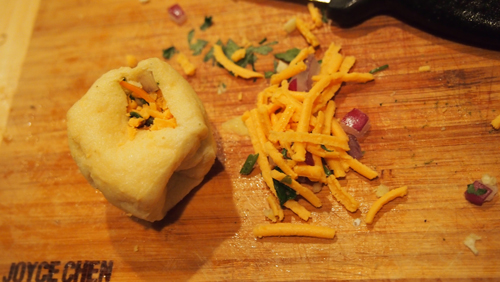
4) After you’ve successfully “stuffed” the pockets, try your best to close the opening by pushing the filling together within the pocket. If you use something that melts like Daiya, then it will effectively form a sort of seal when you fry it. Even if you didn’t use a soy cheese, frying the side where the opening was on will preserve its shape and will make it easier to fry afterwards.
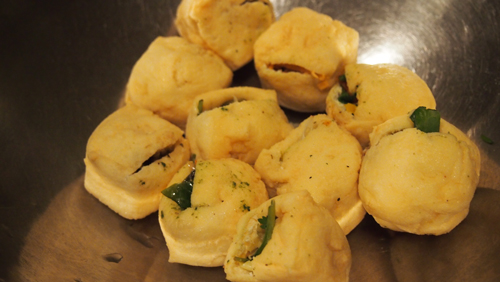
5) Now it’s time to fry the pockets. In an oiled, preheated pan/skillet on medium heat, place the pockets on the opened side first and fry for about 1-2 minutes on each side. Do this for each subsequent side, until they turn brown and crisp, about 10 minutes total.
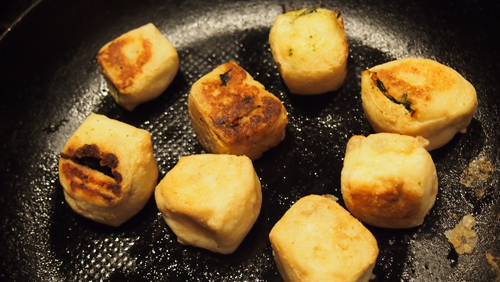
6) You can now enjoy the pockets! Be careful if you used cheese like me, it can burn your mouth if you eat it too fast.
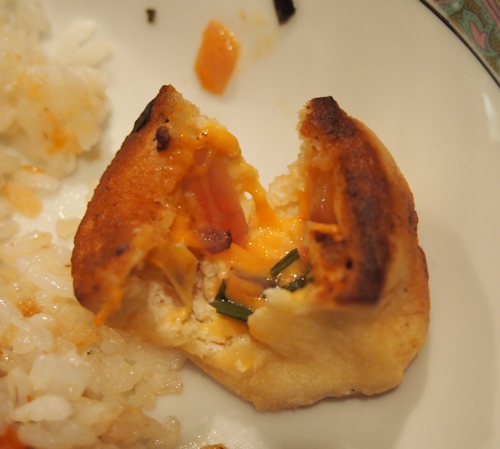
If you don’t have much time on your hands, you can make a dish just as tasty and satisfying with a few simple ingredients.
For this recipe, which takes only about 10-15 mins total (not including prep time) I used a smaller version of the pockets. These are also a bit cheaper, usually about 0.99 compared to 1.29 for the bigger ones. Well worth the money!
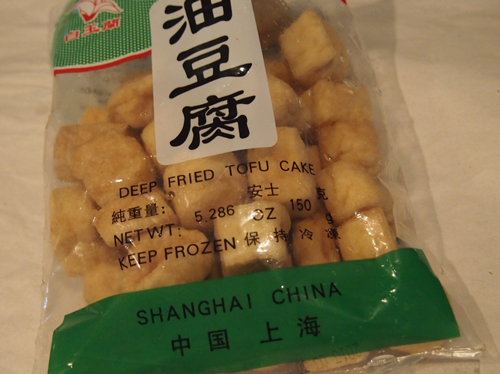
Using a commonly stir-fried vegetable like kale, white mushrooms or broccoli will all taste good with the pockets. Keep in mind, however, vegetables that are more watery like tomatoes and eggplant will lessen the crispy characteristic of the pockets.
For this recipe, I used Beech Mushrooms. These mushrooms are essentially baby mushrooms and are very tender, almost slippery to the palate, and absorb seasonings like a sponge. They are a bit expensive, usually 1.99 a pack, but I love their taste and texture so much I really don’t care. For the purpose of cooking with the pockets, they are an ideal counterpart.
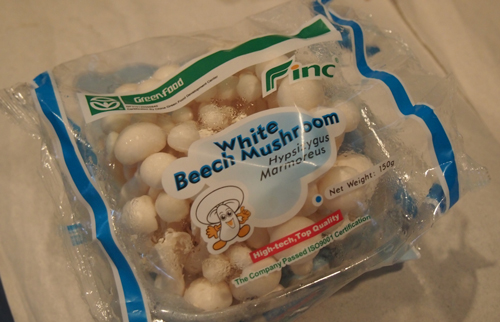
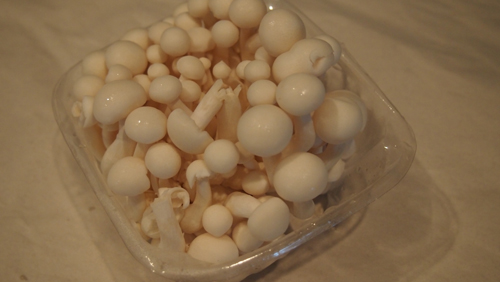
If you aren’t familiar with cooking these mushrooms, not to worry… they are very versatile and easy to work with. To prep the mushrooms,open the package on one side, fill it with water, and slosh it around. Then remove it totally and rinse gently. Cut off the roots (which are usually covered in dirt), being careful not to waste too much of the body. Place the clean shrooms in a bowl.
Recipe:
1) In a generously oiled large skillet or wok, add the tofu pockets and fry on high until they turn crispy and golden brown, about 7-8 mins. At the same time, if you can manage it, also complete step two.
2) In a preheated medium separate skillet, in addition to the vegetable oil, quickly add about 2 tablespoonfuls of soy sauce. The sauce will start to simmer… immediately add the mushrooms to the pan. Stir the mushrooms in the sauce to distribute. Add crushed black pepper and sesame oil to taste, then cover and cook for about 2-3 mins.
3) In the meantime, when the mushrooms are almost ready, turn on the heat again for the pockets (unless you more or less did both dishes at the same time… if you did, then you are quite the maverick!), and have it at the ready.
4) After the mushrooms are ready, combine them, sauce and all, into the pan with the pockets. Fry them together and add seasonings as you like.
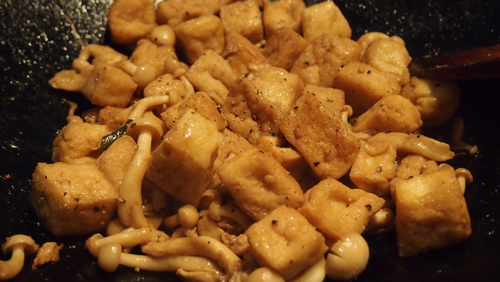
The dish is ready! I commonly consume this dish with a side of Yu Choy, which is one of my favorite types of green veggie, and rice, but you can just as easily have it accompany some noodles or even stuff it into a fresh baguette, it all tastes good. Best of all, it’s not very fattening at all!
